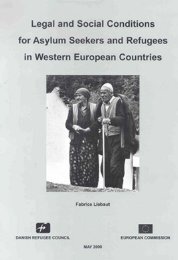Bulgaria - The social impact of seasonal migration
Bulgaria - The social impact of seasonal migration
Bulgaria - The social impact of seasonal migration
You also want an ePaper? Increase the reach of your titles
YUMPU automatically turns print PDFs into web optimized ePapers that Google loves.
54<br />
show that we, the <strong>Bulgaria</strong>ns, are very decent and normal people. In order for this to<br />
happen, it is very important that the different groups <strong>of</strong> deported people are differentiated.<br />
Most <strong>of</strong> them are expelled because they had no address registration, and most <strong>of</strong> them are<br />
working illegally in the hot houses, they are not criminals. <strong>The</strong> problem could be easily<br />
solved by signing a bilateral employment agreement” (interview No. 15).<br />
4.1.4. Impact <strong>of</strong> e<strong>migration</strong> on education and the <strong>social</strong> system<br />
<strong>The</strong> <strong>impact</strong> <strong>of</strong> e<strong>migration</strong> on education is ambivalent. On the one side, data from the<br />
qualitative study made by the research team show that some <strong>of</strong> the families invest<br />
money saved from <strong>seasonal</strong> <strong>migration</strong> in insuring better education for their children.<br />
Acquiring high quality education is usually related to movement to larger educational<br />
centres either in <strong>Bulgaria</strong> or abroad. “Jenny, my daughter, has come here [to Spain] two<br />
years ago, but she was working in Barcelona like a baby sitter and a cook at the house <strong>of</strong><br />
a young family. Our wish was that she could graduate at a western university, so we saved<br />
money for her education. Now she is in Münster (Germany), studying Spanish philology”<br />
(interview No. 21 - Kal<strong>of</strong>er).<br />
Yet on the other side, a study on the access to education in <strong>Bulgaria</strong> found out that one<br />
<strong>of</strong> the frequently cited reasons for dropping out <strong>of</strong> school is the family’s travel abroad<br />
as <strong>seasonal</strong> short- or longer-term migrants (Iliev / Kabakchieva 2002). In all <strong>of</strong> the<br />
surveyed population centres, the research team discovered large-scale <strong>migration</strong> to<br />
Greece, Spain, Portugal, Turkey, Germany, Belgium, <strong>The</strong> Netherlands and Norway. It was<br />
reported that some <strong>of</strong> the children from such families remain in <strong>Bulgaria</strong>, usually in the<br />
care <strong>of</strong> grandmothers or aunts. Since such pupils possess money (sent by their<br />
parents), whereas their grandmothers and aunts tend to be too indulgent, the teachers<br />
claim such students become spoiled, start smoking and drinking, or stop attending<br />
school altogether. If the children leave with their parents, they leave school formally<br />
and from then on drop out <strong>of</strong> sight as far as the educational system is concerned. Should<br />
they come back and enrol at the same school their development would be monitored,<br />
but if they happen to choose another school no one could follow up on them. <strong>The</strong><br />
further fate <strong>of</strong> migrants’ children is virtually unknown. It is very likely that the majority<br />
<strong>of</strong> them will continue their education, but the problem is in the absence <strong>of</strong> information.<br />
Nonetheless, it has turned out that at the moment, the rates <strong>of</strong> dropping out <strong>of</strong> school<br />
among the children <strong>of</strong> migrants are the highest.<br />
Concerning the <strong>impact</strong> <strong>of</strong> <strong>migration</strong> upon the <strong>social</strong> system, one should mention that as<br />
a rule irregular <strong>seasonal</strong> migrants pay neither for <strong>social</strong> insurance nor for their health<br />
insurance. This puts at danger the health <strong>of</strong> <strong>seasonal</strong> migrants and poses grave<br />
problems for their <strong>social</strong> security. At the same time, one should also admit that<br />
employment abroad – no matter whether regular or not – alleviates the burden <strong>of</strong><br />
supporting unemployed people in <strong>Bulgaria</strong>, and financially assisting people with low<br />
incomes. To the extent that <strong>seasonal</strong> <strong>migration</strong> remains conditioned primarily by<br />
unemployment and low wages in <strong>Bulgaria</strong>, the country will be in a position to export<br />
poverty and displace its concomitant problems in the future.

















